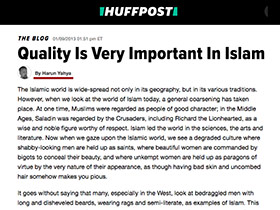
The Islamic world is wide-spread not only in its geography, but in its various traditions. However, when we look at the world of Islam today, a general coarsening has taken place. At one time, Muslims were regarded as people of good character; in the Middle Ages, Saladin was regarded by the Crusaders, including Richard the Lionhearted, as a wise and noble figure worthy of respect. Islam led the world in the sciences, the arts and literature. Now when we gaze upon the Islamic world, we see a degraded culture where shabby-looking men are held up as saints, where beautiful women are commanded by bigots to conceal their beauty, and where unkempt women are held up as paragons of virtue by the very nature of their appearance, as though having bad skin and uncombed hair somehow makes you pious.
It goes without saying that many, especially in the West, look at bedraggled men with long and disheveled beards, wearing rags and semi-literate, as examples of Islam. This occurs because the media has made them so, and these particular men love nothing more than to claim to speak for the whole of the Islamic world. But it is not only in the West that this has happened; in the Islamic world, far too many Muslims see these same men and think to themselves, "Why, look! He wears filthy rags, and has a long and ungroomed beard. Surely this is a holy man!" Or they see a woman in stylish clothes, wearing makeup or having her hair uncovered, and the immediate reaction of far too many is, "Why, this woman is a Jezebel!" This kind of foolish thinking is unfortunately commonplace in the Islamic world.
So how has it come to this? How is it that music, art and beauty is condemned, when music, art and beauty are gifts from God? Why are these gifts, which uplift and elevate the mind and soul, looked upon as curses from the devil himself?
Perhaps it is because we have allowed petty and small-minded provincials with peculiar ideas to rule the discussion for too long. We have allowed these people to enjoy a cultural dictatorship, a "tyranny of moral busybodies," as the Christian writer C.S. Lewis so eloquently said. We have allowed them to become cultural arbiters. And the results? A world without joy or beauty. A world where those men and women who wish to share the talents given to them by God are told their gifts are sins. What madness is this? Truly, a world in which there is no appreciation of beauty and aesthetics is little more than a manifestation of Hell itself.
There is nothing from the Quran that prohibits music or the arts. It is mistaken to say, "The Quran prohibits music!" This is bid'ah, or heresy, and those who introduce such things are committing a sin. As it says in the Quran, "Say, 'Do you see that which God hath provided for you -- you make some of it unlawful (haram) and some of it lawful?'" "Say, 'Did God allow you to do this, or do you tell lies about God?'" (10: 59).
Our Prophet was a man of fine appearance and attribute, and he had an aesthetic appreciation for beauty. He used to grow roses around his house, and in a desert environment growing almost anything is a difficult task. At that time there existed a fragrant oil and our Prophet used to use olive oil as well as that oil mixed with a beautiful smelling rose extract; he used to wear this in his hair as a brilliantine, and it made him appear more youthful. It is said his clothes, his frock and shirt were white and always kept clean and in good repair. His teeth (owing to the use of a miswak, a natural toothbrush) were white and clean. All of these descriptions of his appearance come from the hadiths. All these descriptions are notably different from what we so often see, and all are notably different from what we see in Muslim extremists as well.
So to my fellow Muslims, please do not allow yourselves to fall into the trap of thinking that by looking shabby and scowling, that this makes you a more devout Muslim. Do not fall prey to the notion that forbidding music or art or beauty is somehow the commandment of God. Do not think for one moment that by treating your wife as an object of scorn or contempt, or as your occasional beast of burden when you go to the shops, that you are living the truth of Islam. You are not. You are behaving in an ugly and boorish manner, and this behavior is fodder for those who seek to portray Muslims as savages. And above all, do not fall into that trap of utopian nonsense which says that if the Muslims were simply to go back to the life of the seventh century A.D., then all would be well in the world, and we would all live in perfect contentment forevermore. This rejection of the modern world is not only profoundly silly and highly reactionary, it is dangerous.
And for the Western reader, I ask you not to fall into the trap of thinking that unkempt, unclean and loutish individuals who spout distorted religious speculations mixed with their own superstitions and cultural peculiarities as being wholly representative of Islam. They are not; overall, they are a minority. They get the attention they do simply because they manage to talk over everyone else. And do not fall into the trap of the anti-Muslim bigots; while they like to claim they are only opposed to "extremists" and "radicals," they portray this vocal and extremist minority as representative of the entirety of Islam, when in fact the opposite is true. Extremists speak only for themselves; they are a majority only in their fevered delusions.
Published on the Huffington Post on January 9, 2013
http://www.huffingtonpost.com/harun-yahya/quality-is-very-important-in-islam_b_2429189.html


